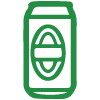Caffeine, Booze, and Running

Many of us imbibe as part of our daily lives, coffee to start the day, maybe wine or beer to wind down. Intuitively, most runners know better than to consume too much caffeine or alcohol when training for a race. But how much is too much? And what is the impact on our bodies?
I was inspired to write this article after experiencing an elevated heart rate on routine, short runs until I figured out the culprit was caffeine. Sensitive to caffeine, I was consuming too much, too soon before running. I also like to enjoy a glass of wine with dinner or a celebratory beer after a race. Is this a good idea?
Dr. Riva Rahl, a preventive medicine physician at Cooper Clinic, helped me set the record straight and provided important information to share with the running community. Her perspective is especially valuable given her running experience. She is a four-year letter winner in Cross Country, Indoor and Outdoor Track and Field, at Rice University, serving as captain 1994-1995 and inducted into the Rice University Athletic Hall of Fame in 2019. She was the female winner of the Dallas White Rock Marathon in 2000 and the Cowtown Marathon in 2000, 2002, and 2008.
Caffeine Helps Runners – Up to a Point
Caffeine is a stimulant to your central nervous system that increases heart rate, mental acuity, and alertness. Dr. Rahl points out the benefits to runners: “It’s a performance-enhancing substance due to its effect on oxygen consumption through glycogen sparing.” This means that more liver glycogen is available to maintain glucose necessary to sustain your muscles through a long run.
Dr. Rahl points out caffeine’s other benefits: reducing drowsiness, reducing pain and exertion perception, increasing power during exercise, and improving recovery from a hard workout.
This is all great! However, what are the risks? Excessive amounts of caffeine can increase blood pressure, cause GI upset, interfere with hydration, and potentially increase the risk of an arrhythmia, an abnormal rhythm that could lead to a serious risk of stroke.
Dr. Rahl suggests a maximum caffeine intake for runners of 200-400 mg per day (e.g., 2-4 cups of coffee). However, people’s sensitivity to caffeine varies, so you will need to find your sweet spot.
Also, consider the half-life of caffeine. It stays in your system 4-6 hours on average, reaching peak level in your blood within 30-60 minutes. This means if you drink two cups of coffee (200 mg of caffeine), then you’ll feel the energy boost within an hour, and after about five hours, you’ll still have 100 mg left in your body, even if you no longer feel the effects.
Here’s a breakdown of caffeine content in popular drinks:
Drink | Caffeine Content |
Brewed coffee (8 oz cup) | 96 mg |
Espresso (1 oz shot) | 64 mg |
Instant coffee (8 oz cup) | 62 mg |
Brewed black tea (8 oz cup) | 47 mg |
Cola soft drink (12 oz can) | 29 mg |
Brewed green tea (8 oz cup) | 28 mg |
Brewed or instant decaf coffee (8 oz cup) | 2 mg |
Energy gels with caffeine have around 40 mg of caffeine, with a range of 20 mg to 100 mg depending on the flavor/variety.
Rule of thumb: If you want the benefits of caffeine during a run, then consider consuming a minimal amount beforehand (40 mg or less). Then, you can enjoy the benefits up to the maximum recommended milligrams after your workout.
Booze and Running – A Tricky Relationship
While alcohol is often associated with fun and celebration, it is in fact a depressant. Not to be a buzzkill, but alcohol consumption offers no real health benefits to runners.
Moderate alcohol consumption has been linked to some health benefits, such as reducing the risk of cardiovascular disease, particularly among those middle-aged and older. However, eating a healthy diet and being physically active have much greater health benefits and have been more extensively studied. Source
Consuming alcohol the night prior to a race or hard workout will likely impair your performance. Dr. Rahl explains what alcohol does to a runner’s body: “Alcohol decreases glucose availability and therefore would decrease fuel for running. Alcohol also decreases alertness and interferes with sleep, so it is likely it would lead to slower recovery from workouts.”
What about the post-race celebratory beer? Dr. Rahl warns that alcohol consumption within an hour of endurance exercise will likely increase platelet aggregation, which can increase the risk of coagulopathy (bleeding disorder) or blood clots. And when one is dehydrated and full of adrenaline at the end of a race, alcohol can increase the risk of a cardiovascular issue, especially for those with high blood pressure.
Rule of thumb: Relax. Runners can still enjoy a drink responsibly. Dr. Rahl does not recommend more than 2-6 drinks per week for any runner. “Any amounts above this will increase the risk for heart disease and cancers (particularly breast and colon), and will likely increase blood pressure,” she explains.
Here is the definition of one drink to use as a guideline for your own alcohol consumption:
Everything in Moderation
We have all heard this before yet always sound advice: moderation is key! Runners can harness the benefits of caffeine—within limits—in order to enhance performance. We can also enjoy a few drinks at the right time, safely and moderately. And of course, always stay hydrated. Cheers!
A special thank you to Riva Rahl, MD, Platinum Physician at Cooper Clinic, for her expertise and participation in this interview and to Cooper Clinic for connecting us. Please click to learn more about Dr. Rahl and Cooper Clinic.
Please click for additional resources regarding the effects of caffeine and alcohol, provided by Cooper Clinic:
Caffeine: How Much is Too Much?
Is a Little Alcohol Good for Your Health? Cooper Experts Weigh In



